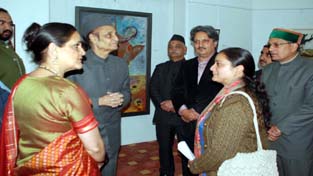
Excelsior Correspondent
JAMMU, Mar 9: Former Sadar-e-Riyasat and sitting MP, Dr Karan Singh today said that the successive Governments have not highlighted the great and significant contributions of Dogra rulers in general and Maharaja Hari Singh in particular.
Addressing a seminar here, this afternoon on the topic -the Dogra Century and Beyond, Dr Karan Singh said that Dogra rulers had made lot of contribution in the State and it was the founder of Dogra rule, Maharaja Gulab Singh who extended the boundaries of his kingdom up to Russian in South Asia.
He said it was Maharaja Ranjit Singh of Punjab who extended the boundaries of India to South Asia and Maharaja Gulab Singh of J&K only.
He said the State and its people suffered a lot due to disaster of partition in 1947 and his father Maharaja Hari Singh who contributed a lot to the welfare of the State and its people was also overtaken by the disaster of partition.
He said the State of J&K had four regions under Dogra rule which included Jammu region, Kashmir Valley, Ladakh region and Gilgit Baltistan.
He said the Dogras ruled the State for over 100 years till partition disaster overtook it and Subcontinent.
Admitting that had there been an understanding between Maharaja Hari Singh and Sheikh Mohammed Abdullah the history of Sub Continent would have been altogether different today. “My father wanted to maintain very good relations with both India and Pakistan and he had mentioned the same in a letter to Lord Mount Betan saying “which of the two dominions he would join he would try to maintain good relations with both and if he joined India still he would maintain good relations with Pakistan”.
Recalling the roll and sacrifices of Brig Rajinder Singh, he said had he not stopped the invaders they would have captured the entire Kashmir.
Dr Singh said the political situation had changed a lot since 1947 in the State and the boundaries of the State are not still clear and uncertainty and tension still prevails.
Dr Karan Singh said though he has no regrets in his life but during the celebration of his 80th birthday he was asked whether he had any regrets in his life or not and “my reply was that I have no regrets except one that I could not make any significant contribution in solving the J&K issue”.
Terming the Amar Mahal Museum and art a landmark in Jammu, he said this excellent museum will turn into a state of art where interactions can take place.
“The people can come here and display their art fair”, he said, adding it is a good development to provide an opportunity to artistic and intellectual talent”.
He said Dogra century is a befitting name to it as the Dogra rule started from 1846 and lasted up to 1947. The history of Dogra rulers is well recognized and the historians by visiting to this art gallery and museum can grasp the contributions of Dogras, he added.
Maintaining that Jammu produced a lot of talent, Dr Karan Singh said the people should feel proud of the same and he highlighted the contributions of many versatile artists of Jammu.
The introductory remarks were made by Dr Jyotsna Singh while Col (retd) J P Singh spoke about the life and times of Maharaja Hari Singh and Prof Jigar Mohammad threw light on historical overview of the social, agrarian and educational reforms during the Dogra rule. Dr Lalit Gupta a renowned art critic of the State gave an over view of the Art Scene in the State in the last century with a special reference to Dogra rulers in general and Maharaja Amar Singh in particular.
Prof Rekha Chowdhary threw light on plurality and Syncretic culture of Jammu region saying that it always stood to the tests of time whenever there were challenges to its composite culture and plurality.
Dr Sandeep Singh shared sacred spaces in Jammu region saying that the pluralistic character of the region got a setback during turmoil as the shrines and festivals which were part of inclusiveness earlier and revered by both the communities became exclusive after turmoil.
Earlier, Dr Karan Singh inaugurated Maharaja Hari Singh Room and art galleries in basement etc.

